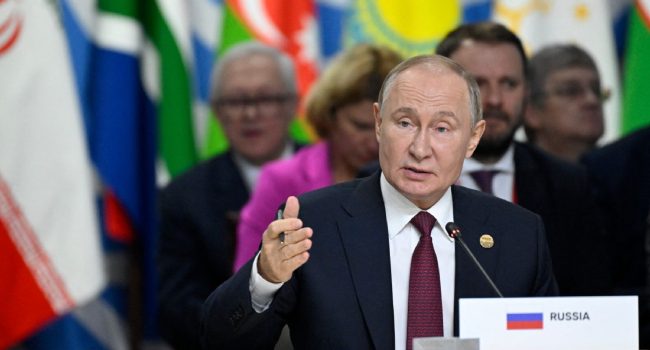BRICS Leaders Unite for Peace in Middle East and Ukraine, Putin Welcomes Mediation Offers
In a significant display of diplomatic unity, world leaders at the BRICS summit in Russia’s central city of Kazan have called for peace in the Middle East and Ukraine, casting a spotlight on the urgent need for conflict resolution in both regions.
The summit, which brought together around 20 world leaders, including Russian President Vladimir Putin, Chinese President Xi Jinping, Indian Prime Minister Narendra Modi, and South African President Cyril Ramaphosa, among others, provided a platform for leaders to address pressing global issues.
In a joint statement, the BRICS group expressed deep concern over ongoing conflicts and instability in the Middle East and North African region, criticizing Israeli attacks on UN staff in southern Lebanon and urging that Lebanon’s "territorial integrity" be "preserved."
Leaders at the summit also lined up to call for peace in both the Middle East and Ukraine, with Iran’s President Masoud Pezeshkian urging BRICS members to "use all their collective and individual capacities to end the war in Gaza and Lebanon."
Chinese President Xi Jinping, a key Putin ally, reiterated his call for a ceasefire, emphasizing the need to "stop the killing and work tirelessly for a comprehensive, just and lasting settlement of the Palestinian issue."
Brazilian President Luiz Inacio Lula da Silva, who addressed the summit via video conference, also called for escalation in both the Middle East and Ukraine to be avoided, stressing the importance of restoring the ability to work together toward common goals.
Meanwhile, European Union officials urged BRICS members to use the forum to pressure Putin to "immediately" halt his offensive on Ukraine. In response, Putin welcomed offers by several BRICS leaders to mediate in Ukraine, even as he touted the "very positive dynamics on the front for the Russian armed forces."
Indian Prime Minister Narendra Modi and Brazilian President Luiz Inacio Lula da Silva also issued calls for peace, with Modi emphasizing the need for dialogue and diplomacy, while Lula stressed the importance of opening peace talks between Moscow and Kyiv.
The BRICS summit, which serves as an alternative to Western-led international organizations like the G7, provided a platform for leaders to promote a multipolar world order and advocate for the Global South to play a bigger role on the world stage.
As the world watches the developments in the Middle East and Ukraine, the BRICS summit has sent a clear message: that the time for peace and diplomacy is now, and that leaders must work together to address the pressing challenges facing the world today.
What’s Next?
- Turkish President Recep Tayyip Erdogan will hold talks with Putin later on Wednesday, while UN Secretary General Antonio Guterres will meet the Kremlin leader a day later.
- BRICS leaders will continue to engage in diplomatic efforts to promote peace and stability in the Middle East and Ukraine.
- The international community will be watching closely to see how the BRICS platform can effectively address global challenges and promote a multipolar world order.
Only time will tell if the BRICS summit’s call for peace will translate into tangible action on the ground. One thing is certain, however: the world is watching, and the need for peace and diplomacy has never been more urgent.
